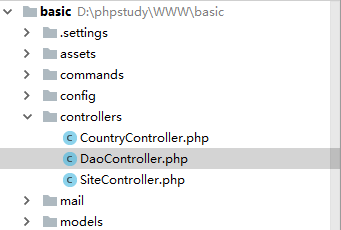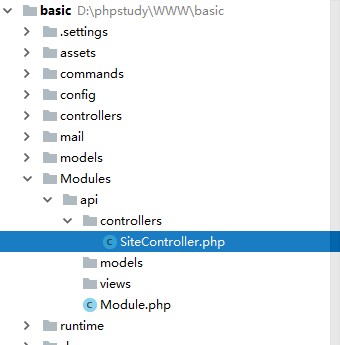Yii2访问自定义模块下的controller:https://www.cnblogs.com/eco-just/p/8868487.html
之前,由于所要访问的controller都是位于根目录下的controllers目录下,就像下面这样:
此时,我们可以直接通过 localhost/basic/web/index.php?r=dao/index 来访问图中DaoController.php里的actionIndex。
但是如果,我们将controller、view等有关联的独立出来作为一个模块Modules,那么又将怎样去处理呢。
就像上面这样,这个Site控制器里面的action又将如何访问呢。
1.建立目录
首先建立如上的目录结构,在api下的以及目录有三个文件夹和一个文件Module.php,这个php文件内容如下:
* api module definition class
*/classModule extends \yii\base\Module
{
/**
* @inheritdoc
*/public$controllerNamespace ='app\modules\api\controllers';
/**
* @inheritdoc
*/public function init()
{
parent::init();
// custom initialization code goes here }
}
这个文件可以直接复制,无需作任何修改,只是注意红字部分的命名空间,不要写错了!
2.web.php
还记得项目根目录下的config文件夹下有个web.php文件么,添加如下字段:
$params= require __DIR__ .'/params.php';
$db = require __DIR__ .'/db.php';
$config = [
'id'=>'basic',
'basePath'=> dirname(__DIR__),
'bootstrap'=> ['log'],
'aliases'=> [
'@bower'=>'@vendor/bower-asset',
'@npm'=>'@vendor/npm-asset',
],
'components'=> [
'request'=> [
// !!! insert a secret key in the following (if it is empty) - this is required by cookie validation'cookieValidationKey'=>'jjsYJ_ju0W8ifOv5mY3JBMI6DOppFlo6',
],
'cache'=> [
'class'=>'yii\caching\FileCache',
],
'user'=> [
'identityClass'=>'app\models\User',
'enableAutoLogin'=>true,
],
'errorHandler'=> [
'errorAction'=>'site/error',
],
'mailer'=> [
'class'=>'yii\swiftmailer\Mailer',
// send all mails to a file by default. You have to set
// 'useFileTransport' to false and configure a transport
// for the mailer to send real emails.'useFileTransport'=>true,
],
'log'=> [
'traceLevel'=> YII_DEBUG ?3:0,
'targets'=> [
[
'class'=>'yii\log\FileTarget',
'levels'=> ['error','warning'],
],
],
],
'db'=> $db,
/* 'urlManager' => [
'enablePrettyUrl' => true,
'showScriptName' => false,
'rules' => [
],
],
*/ ],
'modules' => [
'api' => [
'class' => 'app\modules\api\Module',
],
],
'params'=> $params,
];if (YII_ENV_DEV) {
// configuration adjustments for 'dev' environment$config['bootstrap'][] ='debug';
$config['modules']['debug'] = [
'class'=>'yii\debug\Module',
// uncomment the following to add your IP if you are not connecting from localhost.
//'allowedIPs' => ['127.0.0.1', '::1'], ];
$config['bootstrap'][] ='gii';
$config['modules']['gii'] = [
'class'=>'yii\gii\Module',
// uncomment the following to add your IP if you are not connecting from localhost.
//'allowedIPs' => ['127.0.0.1', '::1'], ];
}return$config;
为了避免看的时候出错,上面红字的“键”是出于同一级的,红字加粗的是我们为modules添加的相关配置信息,相当于在应用中注册了刚才定义的组件(api)。
3.api组件下的controllers
现在我们在Modules/api/controllers下新建一个SiteControllers.php,内容如下:
{
publicfunctionactionIndex(){ echo"hello world";
}
}
注意命名空间就好~~~
4.浏览器访问
最后就是浏览器访问这个actionIndex了,浏览器输入: http://localhost/basic/web/index.php?r=api/site/index
至此,结束~~~


